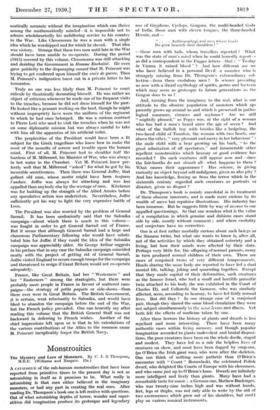M. Pomcare's Memoirs
BRF.NCK statesmen, with the aptitude of their race, can gener- ally write a thesis with enchanting compactness, but it by no means follows that they reject the practice of writing at length. In our time we have had the immense apology of M. Emile 011ivier for the " Liberal Empire." We have had M. Paleo- logue's long and carefully elaborated memoirs. And we are still immersed in the lengthy unfinished memoirs of M. Poincare. Sir George Arthur is not only an admirable trans- lator but a sagacious and daring editor. His fourth volume in English of M. Poineare's memoirs compresses two of the French volumes into one. This has been done by omitting passages which dealt with French politics, and with the President's visits to the Armies, to military factories, and so forth, which were chiefly, if not entirely, of interest to French people.
Whatever we may think of M. Poincar4 as a statesman— and for our part we have always found him flinty aria teethe-
inatically accurate without the imagination which can thrive among the mathematically minded—it is impossible not to admire wholeheartedly his unfaltering service to his country in the War. Like Clemenceau he was a man with a single idea which he worshipped and for which he slaved. - That idea was victory. Strange that these two men until late in the War should have been unable to co-operate. During the period (1915) covered by this volume, Clemenceau was still attacking and deriding the Government in Ilomme Enchaine. He even gave publicity to the disparaging canard that M. Poineare was trying to get conferred upon himself the croix de guerre. Then M. Poineares indignation burst out in a private letter to his tormentor.
.Truly no one was less likely than M. Poineare to court ridicule by theatrically decorating himself. He was rather an object of criticism whenever he made one of his frequent visits to the trenches, because he did not dress himself for the part. He looked like a peasant working on the land, though he might without impropriety have worn the uniform of the regiment to which he had once belonged. He was a curious contrast to Pierre Loti who used to visit the trenches when he was not on some diplomatic mission but was always careful to take with him all the apparatus of his artificial toilet.
The perplexities of the President would have been a fit subject for the Greek tragedians who knew how to make the most of the assaults- of sorrow and trouble upon the human mind. First of all, M. Poineare had to shoulder half the burdens of M. Millerand, his Minister of War, who was always in hot water in the Chamber. Yet M. Poineare knew per- fectly well that M. Millerand "asked" for what he got by his incurable secretiveness. Then there was General Joffre, that gallant old man, whose motto might have been toujours l'audace. Joffre was always for attacking and was less appalled than anybody else by the wastage of men. Kitchener was for building up the strength of the Allied Armies before any speculative action was undertaken. Nevertheless, Joffre sufficiently got his way to fight the very expensive battle of Loos.
The President was also worried by the problem of General Sarrail. It has been sardonically said that the Salonika campaign—about which there is much in this volume— was fought in order to get General. Sarrail out of France. But it seems that although General Sarrail had a large and clamorous Parliamentary following who would have substi- tuted him for Joffre if they could the idea of the Salonika campaign was appreciably older. Sir George Arthur suggests in his preface that in any case the Salonika campaign coincided neatly with the project of getting rid of General Sarrail. Joffre visited England to secure enough troops for the campaign and threatened to resign if Great Britain would not co-operate adequately.
France, like Great Britain, had her " Westerners " and her " Easterners " among the strategists, but there were probably more people in France in favour of scattered cam- paigns—the strategy . of petits paqucts or side-shows—than there ever were in Great Britain. The British Government, it is certain, went reluctantly to Salonika, and would have liked to abandon the campaign before the end of the War, but the French policy prevailed. One can honestly say after reading this volume that the British General Staff was not backward in deferring to French wishes. Another of the chief impressions left upon us is that in his calculations of the various contributions of the Allies to the common cause M. Poineare inexplicably forgot the British Navy,



































 Previous page
Previous page